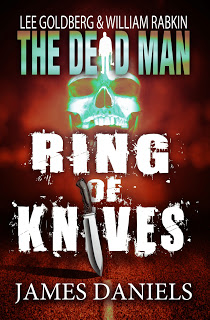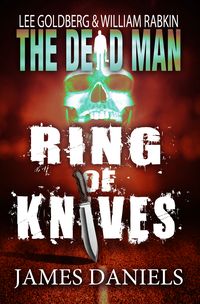Booklife has posted part two of their terrific, indepth interview with James Daniels, author of DEAD MAN #2: RING OF KNIVES. And if you want to know why we signed him up, and why we're so excited to have him writing on our series, all you have to do is read this excerpt:
What was it about Lee and Bill’s “dark mythology” that got you excited? What direction did you take in?
James L. Daniels: I love the fact that the central character in the series is a loner who travels endlessly in search of the answer to a mystery, which will heal both himself and others. To me, this type of tale hearkens back to the Grail legend, which I incorporated into Ring of Knives. I think that Matt is the modern-day equivalent of the medieval knight errant, and also of the gunslinger-in-a-white-hat, who is his American descendant. This set-up is an incredibly flexible template for storytelling, and it allows the author to take it in any direction possible. I’ve seen brief summaries of the stories to come, and they range from gritty urban shoot-em-ups to gothic Lovecraftian lore. It’s wonderful stuff. My own brand of pulp is derived pretty directly from Edgar Rice Burroughs; he’s the one (along with “The Uncanny X-Men”) who first snagged my attention as a twelve-year old, and those old-style heroics never cease to move me. So I’ve taken a lot of inspiration from John-Carter-type stories and fashioned my own tale, which I dressed up in the trappings of Clive Barker, fed raw meat, and unleashed.
What is up with Mr. Dark, anyway?
James L. Daniels: That’s a good question, and every author in the series is going to come up with their own interpretation. Lee and Bill have been enormously generous letting the writers contribute to the development of the Dark Man’s nature. And it’s interesting, because – like Matt’s character – the Dark Man is an archetype that’s incredibly versatile. A blogger recently implied that Lee and Bill may have borrowed the evil-clown idea from Todd McFarlane’sSpawn series. But this is nonsense. The unpredictable trickster is one of the oldest characters in fiction. McFarlane’s Violator was begat by Stephen King’s Pennywise who was begat by Jerry Robinson’s The Joker, who was begat by Edgar Allen Poe’s Hop-Toad, who was begat by Mr. Punch, who was begat by Shakespeare’s Fool, who was begat by Harlequino (and perhaps Sir Thomas Malory’s Merlin), who was begat by Loki, who was begat by Raven (Europe), Coyote (America), and Spider (Africa). They are all manifestations of the same principle. What is that principle? Every writer of the Dead Man will come to his or her own conclusions.
For myself, however, that principle is Entropy, and the madness and despair that arise from our recognition that all our efforts will ultimately end in death. The major challenge of life is to withstand – and maybe even overcome – that terrible prospect. In the Welsh Grail legend “Peredur”, the hero is frequently tormented by a black hag who reminds him at every turn that all his acts of valor are causing more harm than good. That hag, portrayed eight hundred years ago, is the direct ancestor of Mr. Dark. And you don’t have to be a medieval knight errant to know who she is. I’ve seen her. And I bet you have, too. How we deal with her terrible message is the biggest challenge that we face in life. And one of the ways we learn to deal with it is by reading about others who confront it head-on. Matt Cahill is a hero because he does just that. That’s why it’s a thrill to read about him. That’s why, when we read about him beating the devil, we set down the book hopeful and happy, believing – for a time – that we can, too.
Check out the rest of the interview for some revealing insights into his creative process.



